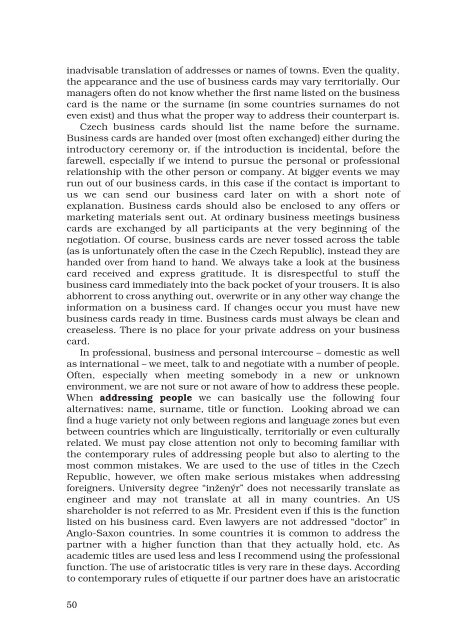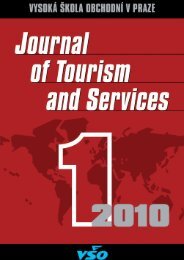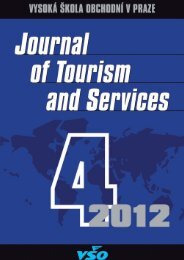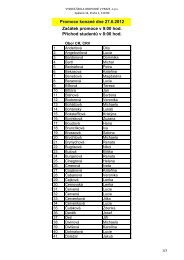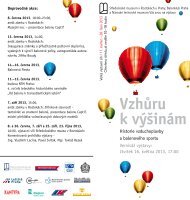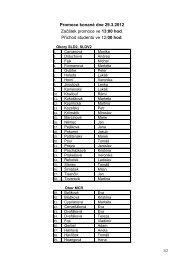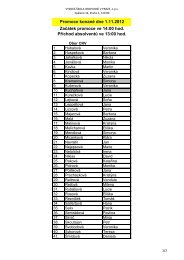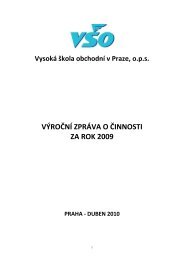Sestava 1 - Vysoká škola obchodnà v Praze
Sestava 1 - Vysoká škola obchodnà v Praze
Sestava 1 - Vysoká škola obchodnà v Praze
You also want an ePaper? Increase the reach of your titles
YUMPU automatically turns print PDFs into web optimized ePapers that Google loves.
inadvisable translation of addresses or names of towns. Even the quality,<br />
the appearance and the use of business cards may vary territorially. Our<br />
managers often do not know whether the first name listed on the business<br />
card is the name or the surname (in some countries surnames do not<br />
even exist) and thus what the proper way to address their counterpart is.<br />
Czech business cards should list the name before the surname.<br />
Business cards are handed over (most often exchanged) either during the<br />
introductory ceremony or, if the introduction is incidental, before the<br />
farewell, especially if we intend to pursue the personal or professional<br />
relationship with the other person or company. At bigger events we may<br />
run out of our business cards, in this case if the contact is important to<br />
us we can send our business card later on with a short note of<br />
explanation. Business cards should also be enclosed to any offers or<br />
marketing materials sent out. At ordinary business meetings business<br />
cards are exchanged by all participants at the very beginning of the<br />
negotiation. Of course, business cards are never tossed across the table<br />
(as is unfortunately often the case in the Czech Republic), instead they are<br />
handed over from hand to hand. We always take a look at the business<br />
card received and express gratitude. It is disrespectful to stuff the<br />
business card immediately into the back pocket of your trousers. It is also<br />
abhorrent to cross anything out, overwrite or in any other way change the<br />
information on a business card. If changes occur you must have new<br />
business cards ready in time. Business cards must always be clean and<br />
creaseless. There is no place for your private address on your business<br />
card.<br />
In professional, business and personal intercourse – domestic as well<br />
as international – we meet, talk to and negotiate with a number of people.<br />
Often, especially when meeting somebody in a new or unknown<br />
environment, we are not sure or not aware of how to address these people.<br />
When addressing people we can basically use the following four<br />
alternatives: name, surname, title or function. Looking abroad we can<br />
find a huge variety not only between regions and language zones but even<br />
between countries which are linguistically, territorially or even culturally<br />
related. We must pay close attention not only to becoming familiar with<br />
the contemporary rules of addressing people but also to alerting to the<br />
most common mistakes. We are used to the use of titles in the Czech<br />
Republic, however, we often make serious mistakes when addressing<br />
foreigners. University degree “inženýr” does not necessarily translate as<br />
engineer and may not translate at all in many countries. An US<br />
shareholder is not referred to as Mr. President even if this is the function<br />
listed on his business card. Even lawyers are not addressed “doctor” in<br />
Anglo-Saxon countries. In some countries it is common to address the<br />
partner with a higher function than that they actually hold, etc. As<br />
academic titles are used less and less I recommend using the professional<br />
function. The use of aristocratic titles is very rare in these days. According<br />
to contemporary rules of etiquette if our partner does have an aristocratic<br />
50


